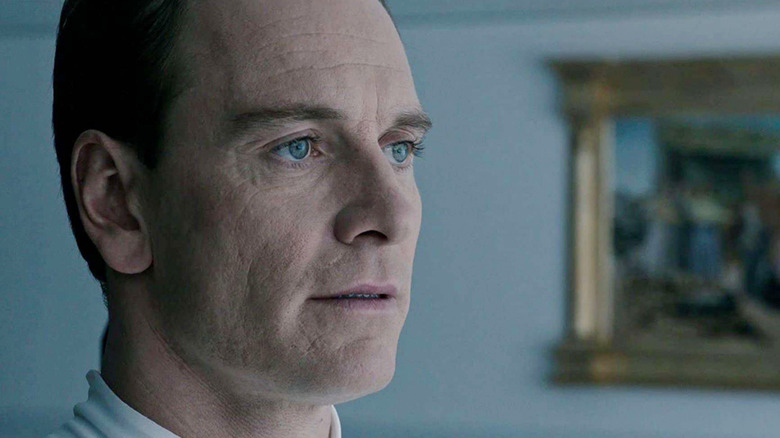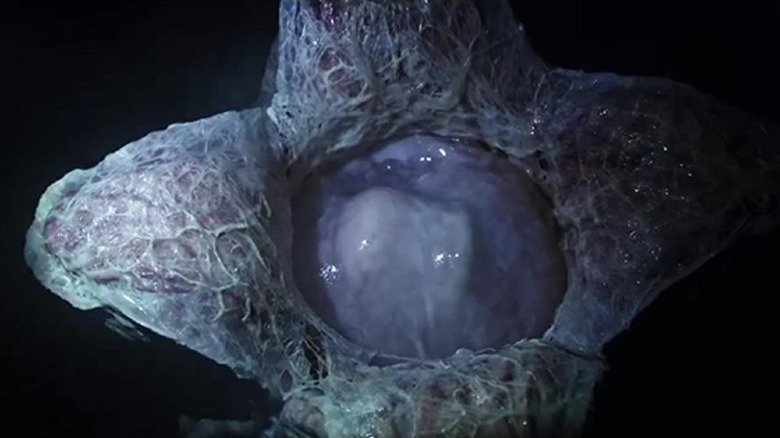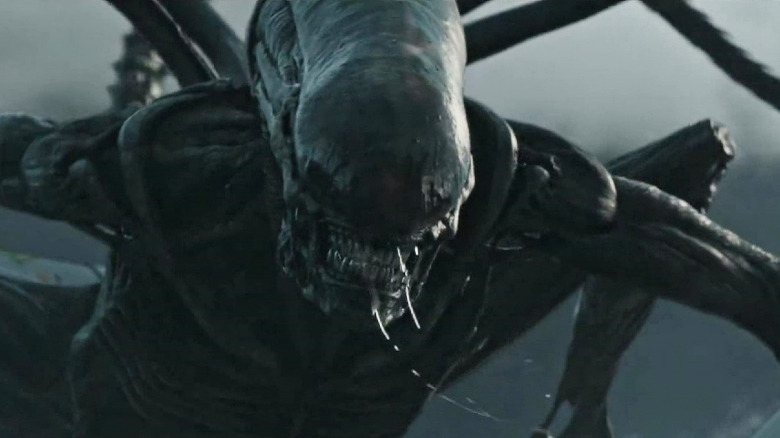Alien: Covenant Took Ridley Scott Back To His Practical Roots
Is Ridley Scott's 2017 movie "Alien: Covenant" a bold step forward for the "Alien" franchise? Or an ill-advised attempt to course-correct after the polarizing "Prometheus"? I would argue it's both. Scott was well-aware that many fans were put off by the lack of "Alien" connections in his 2012 prequel, including the absence of a full-blown Xenomorph. In time, he would turn to his "Gladiator" scribe John Logan to rewrite the script for "Covenant" with this in mind. The result is part Xenomorph slaughter-fest, part Gothic sci-fi horror tale about the act of creation and the dangers of trying to play God.
As the creator of "Penny Dreadful" and writer of Tim Burton's "Sweeney Todd: The Demon Barber of Fleet Street," Logan clearly has a soft spot for the Grand Guignol. This explains his approach to "Covenant," which was to focus on the android David (Michael Fassbender) as the Dr. Frankenstein of this story. It may also account for why the movie feels a tad been-there-done-that when the Xenomorphs are running amok. For all the visceral imagery Scott tosses onto the screen in these scenes, he, too, seems to care much more about David than just about anything (or anyone) else in the film.
Not helping matters, the Xenomorph sequences are heavier on CGI, which Scott prefers to avoid over-using. He discussed this with The Guardian in 2017, citing the terrifying power of the practical elements in "Jaws":
"I was always put off from swimming ever since I watched 'Jaws'. I quite liked swimming, actually, and I'd occasionally dive, but once I saw 'Jaws' there was no way I was ever going to learn to surf – no way! Because I can imagine my legs, my little pinkies hanging underneath the surfboard and I know I'm going to be the one."
Return of the chest-burster puppet
Ridley Scott's practical-heavy methods are partly the result of when he began his career. Directing films like "Alien," "Blade Runner," and "Legend" in the late 1970s and early '80s, he depended on matte paintings, miniatures, and other analog visual effects to realize his vision. With the rise of CGI, Scott has adapted to using green screens when needed but otherwise aspires to build the scenery or capture real-world footage as much as possible. It's not that Scott feels CGI is inherently bad, either. Rather, he sees it as a double-edged sword, as he told Emmanuel Levy in 2017:
"The fact that I had to have a guy in a rubber suit [play the Xenomorph] in 1979, cause that was the only method, but having to make the mechanics and make the head and the double mouth and all of that kind of thing. I think it was really well done considering it was 1979. Nothing digital at all. Later, I have got digital capability where you can do anything, but there's something about digital that you have to be very careful about that it doesn't look digital."
He went on to discuss the difficulties of actors having to react to a "blank space" where CGI will be added in post-production. This, in turn, is why he elected to have a performer in a suit on-set for the actors in "Alien: Covenant" to react to while filming the Xenomorph scenes. It's also why he used a puppet for the scene where a character is killed by a chest-burster, much like he did on "Alien" nearly 40 years earlier. Even then, Scott copped to tweaking the footage digitally to make it more convincing. "The digital process gives you final gloss and polish," as he put it.
On franchises and making money
Far from a home run, "Alien: Covenant" earned even more mixed reviews than "Prometheus" and grossed $240.9 million, a major drop-off from its predecessor's $403 million box office take. Thanks to Ridley Scott's tight handle on the budget, "Covenant" was still a financial success but only just so. In the director's eyes, though, that's all that really mattered, as he told The Guardian:
"Franchise always sounds like a vaguely not-very-nice word, because it means making money. And there's nothing wrong with making money in the film industry – in fact it's what it's all about. If there's a big film that's a disaster, it's bad for everybody. If there's a little film that's a huge success, it's good for everybody. That's the industry we're in."
Would things have gone any different had "Prometheus" not been so divisive? It feels like franchise commitments are the thing that prevented Scott and John Logan from making a Xenomorph-free version of "Covenant," not because they had any truly fresh ideas for what to do with the creature. That's also why my own feelings on the movie lie somewhere in the middle between those who think it's seriously under-rated and those who see it as one of the worst sci-fi films Scott has ever directed. The stuff with David is pretty spell-binding. The rest of it? Not so much.
Perhaps David's benevolent counterpart in the film, the advanced android Walter (Michael Fassbender, again), had a point: "When one note is off, it eventually destroys the whole symphony, David."


